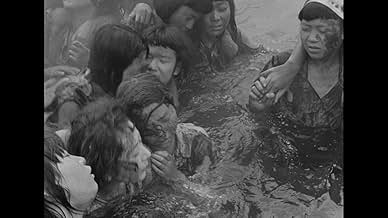Brilliant and extremely realistic retelling of the day in Hiroshima that the bomb dropped and following days.Brilliant and extremely realistic retelling of the day in Hiroshima that the bomb dropped and following days.Brilliant and extremely realistic retelling of the day in Hiroshima that the bomb dropped and following days.
- Director
- Writers
- All cast & crew
- Production, box office & more at IMDbPro
Featured reviews
I'm not sure the Teacher's Union got what they wanted out of this movie; the trouble with directors is they go off and make the movie they want instead of the one you want. In any case, some of the sequences looked like modern 'slow zombie' movies, except they seemed much more real and terrifying. The union did not make a third movie. Perhaps they ran out of money.
Hiroshima, the movie, is based on a book called Children Of Atomic Bomb, which is a collection of stories by child survivors of the attack. Ninety thousand Hiroshima residents, many of them hibakusha (a term referring to the survivors of the atomic bombings of Hiroshima and Nagasaki), labour unions and a head of university volunteered to help the pro-peace and pacifist movie to be made as no commercial entity and studio would help or touch it. The Japanese teachers' Union financed the film to promote peace. The film is now restored as best as possible following its rediscovery. It depicts the period during World War II prior to and during the atomic bombing and the physical and societal aftermath
The focus of the film is the children, in particular students from a school, one of whom we learn right away has something typical of the post-war period namely leukemia which she, her fellow students and teachers call 'atomic bomb illness.' She confesses to her friends that she doesn't want to die. The students are studious, but also in varying forms of denial, shock and ignorance. They read of the American hypocrisy of howling when Germany uses poison gas, but then itself drops atomic bombs on Japanese cities. Today's Japanese know little about the dates and details of the atomic bombs over their country, but ironically even the children of the 1950s had little factual information about what had happened. Indeed the contemporary conservative Japanese government of 2017 voted against the abolition of nuclear weapons at the United Nations. Back to the children and during the war they knew American 'B' bombers by sight and sound, yet and obviously no one expected the atomic bomb given how the technology was new and never used prior. The aftermath was unbelievable. After thinking for some time the best description of the depiction in the film is none other than 'hell.' What the viewer sees is hell. Man and woman, old and young, civilian and military are in an actual hell and no grainy sixty-year-old footage can distort, diminish or mask it. The film demonstrates the hell other films try to portray: dark, smoky, grim; devastation, rubble, piles of forlorn bodies suffering or dead everywhere with no respite or safety as black rain pours from the sky on the charred and burnt bodies and the living alike. The children are young, but injured or dying at worst and orphaned, sick, suffering, in gangs and separated from family and alone at best. In contrast, we see shots of Japanese harlots hand-in-hand with American soldiers after the war walking around in dresses or sitting and dancing with them at dance clubs. A student succumbs to cancer following her blood poisoning due to radiation in a barebones hospital. It is depressing beyond belief. The film is even-handed - if one could call anything the flip side of civilians incinerating as an atomic bomb drops from the sky fair - and the audience sees Japanese working and mobilizing during the war, practicing and child labour in the name of emperor. The Japanese army dishes out propaganda continuously and even once the atomic bomb is dropped a general is seen demanding a civilian salute him. Yet, no soldier helps the civilian rescue his trapped wife. Then the Japanese officers are seen sitting around plotting to further lie to the citizens and discussing the best way to kill the "rumours" as opposed to helping the citizens or confronting the reality on the ground.
As the world turns some things never change. Both the American war criminals and the Japanese elites - like the emperor - are in another world comfortable with full stomachs and never missing a meal as hell unfolded.
The film's beginning is very powerful. A narrator describes the morning routine of the air crew destined to drop the bomb and obliterate Hiroshima, the sun rising, the pilot's thoughts and fears. Then we see children in a high school classroom. One cries out and the narration, which is actually playing on a record, is stopped by the teacher. Enough about the world changing event, it's time to think of the innocents on the ground. Several years have passed since the bombing but the children are succumbing to leukaemia, to the effects of radiation poisoning. Students in the class are desperate to talk about something that has scarred their world, over which a pall of silence has fallen. They visit a sick girl in hospital. They tell stories of kids who've fallen out of society. They talk about what it means to have the marks, to have witnessed the flash. Then we go back to 1945, to a city full of people living their lives, albeit under the cult of the emperor, military types making them drill and run around, and bow to his imperial majesty. And the minutes go by, and we wait...
Then it happens.
This movie is mostly a dramatisation, with some documentary footage used as well, and it was a community effort to make the movie work, on location, real artefacts from the bombing, and actual survivors acting in the movie. The movie is scored by Akira Ifukube with a dirge for orchestra and choir that is powerfully affecting, much like, for example, adagios by Shostakovich or the Memorial to Lidice by Martinu; the wordless choral part if anything makes Akira's music more emotionally intense.
I used the words devastating and exposure earlier, without intending irony, but what about the word trigger, or triggering. Someone had to pull a trigger of sorts, one presumes, or at least press a button or two, to drop the atom bomb. Makes you think how juvenile, no, how infantile people are in the 21st century who either claim victimhood for having been 'triggered', or who worry overtly about triggering someone's feelings. Watch what happens when somehwere, out of sight, the a trigger is pulled; the gawping Japanese school kids and adults look up at the sky, wondering why the alarm hasn't gone off to tell them to take shelter. Watch what it meant to be alive in the aftermath of the blast. Then see if you can use the word 'triggered' ever again and call yourself sane.
Needless to say, Hiroshima (1953) is a difficult watch. It is tough like watching The Passion of the Christ is tough. It makes you desperate. It makes you want to scream. It makes you want to cry for your own comfort. It is an audiovisual lament, a threnody for people compelled to live at a time when a few individuals had developed the power and the will to potentially destroy nations, in the blink of an eye.
But one has to decide if a movie is the best way to explore this subject. In isolation, I'd say no, one needs more. The movie is based upon the accounts given by the children of Hiroshima. The movie goes on to include the bloodymindedness of the Japanese military, attempts to suppress the truth about what had happened so as not to dent morale - and don't forget this film's circulation was viciously delimited to not upset the political class or anyone on the US side of the story - but I suppose if you want to know more about the military strategic context for dropping the bomb then you need to look elsewhere; to a documentary or two, or read a history of the war. Maybe you want to go see the new Christopher Nolan movie, Oppenheimer (2023), although given his tendency towards aggressive barrages of music and noise - there are already reports that the actors' dialogue can barely be heard - and a potentially confusing non-linear timeline, chances are you'll not come out of the movie exactly enlightened. This film, Hiroshima, is based upon lived experience, and it is terrifying.
A must-see, if you've got the stomach for it.
Did you know
- TriviaMore than 100,000 people acted as extras without pay in the making of the film, most of whom were Hiroshima locals, and many of whom had lost friends or family in, or had even personally survived, the bombing.
- Quotes
Narrator: For a moment, the navigator forgot he was in a war and gave himself over to his thoughts. He suddenly remembered what was about to happen to the people of Hiroshima. His mission was bringing doom to those people. The "gadget" in the belly of his plane was a weapon far beyond imagination. It was an atomic bomb. The 20th Century had seen the advent of a bomb powerful enough to kill every human being within a kilometer of its blast center. Worse still, the radioactivity from the bomb would do incalculable damage to all living creatures in the vicinity. Hiroshima would instantly become a city of corpses. That thought led Van Krik to a feeling of utter emptiness. Overwhelmed by sadness, desperate for something to cling to, he suddenly recalled his mother's face.
- Alternate versionsThere is an Italian edition of this film on DVD, distributed by DNA Srl: "HIROSHIMA (1953) + LE CAMPANE DI NAGASAKI (1950)" (2 Films on a single DVD), re-edited with the contribution of film historian Riccardo Cusin. This version is also available for streaming on some platforms.
- ConnectionsFeatured in Hiroshima mon amour (1959)
- How long is Hiroshima?Powered by Alexa
Details
Box office
- Budget
- $240,000 (estimated)
- Runtime
- 1h 44m(104 min)
- Color
- Sound mix
- Aspect ratio
- 1.37 : 1


























